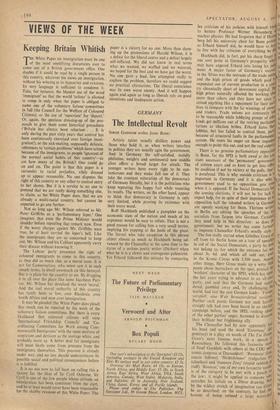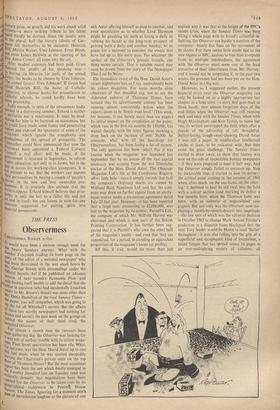GERMANY
The Intellectual Revolt
SARAH GAINHAM writes from Bonn: Artistic talent usually dislikes power and those who hold it, so when writers interfere in politics they are usually agin the government. And in Germany' the self-satisfied, stolidly philistine, weighty and sentimental new middle class offers a broad target for attack. The younger writers have every right to be can- tankerous and they make full use of it. They take the constant reiteration of the democracy of Germany literally, but it is the politicians who - keep repeating this happy fact while resenting its results. The writers, on the other hand, appear to think that democracy in Germany is only very limited, while proving its existence with their every word.
Rolf Hochhuth published a pamphlet on the economic state of the nation and much of his argument would be easy to refute. That is not a good reason for calling him a very small terrier, implying his yapping at the heels of the great. The literati who take exception to this phrase object almost as much to Hochhuth being ad- vanced by the Chancellor at the same time to the status of a serious poetic writer (Dichtet) when what he is is a clever and courageous polemicist. Yet Erhard followed this mistake by comparing
Ii' ci c( in
In
11 ar pl
tc
ft as C
a
(11 fl; re Cr gr
C
C
g( hi gt ti( th
ash
gi Dt at cc
C
lay criticism of his policies with himself toil to lecture •Professor Werner Heisenberg nuclear physics. He had forgotten that if Heis berg left his university chair for Bonn politi as Erhard himself did, he would have to 10 to live with lay criticism of everything he d,, Hochhuth did, in fact, put his sharp finger one sore point in Germany's prosperity wh may have angered Erhard into losing his j ment. A major factor of Germany's recov in the 'fifties was the restraint of the trade urn and the high prices of goods which paid expansion out of current production in a co try chronically short of investment capital. high prices naturally affected the working cla more than others and they have not since re; ceived anything like a repayment for their sad.' flees to compare with the fat winnings of owner` and traders. Trade unions are constantly t°' to be reasonable while lobbying groups of &V kinds get millions out of the retiring parliatnee tarians as election bribes. Erhard hates the" lobbies, but has failed to control them, pat because of structural faults in the parliamenttl system. He vents his anger on those impudee enough to point this out, and not the real culprits There is no genuine parliamentary oppositiot in Bonn, for the SPD is both awed at the coif stant successes of the 'permanent' governiveril of sixteen years and so keen to get into office.' by coalition if not by victory at the polls, that It is paralysed. This is why outside criticism is se important in Germany and it is also whY government used to no opposition gets cross when it is opposed. If the Social Democrats lose the coming elections, it will not be for lack °I, expert help, for in spite of their impotence as en opposition half the talented writers in Germany are openly working for them. Thirteen write° in Berlin are editing the speeches of the,ta socialists from Jargon into German. Certain they need help in this direction : so does the government, but no writer has come forward to improve Chancellor Erhard's woolly style. , The fun really started when Gunther Grass se' off from his Berlin home on a tour of speeches in aid of the Social Democrats, a party he doe/ not belong to, for which the entrance fee 0' about 3s. 6d and which all sold out • even in the Krone Circus with 3,500 seats. Arrioaf other things, Herr Grass made up a witty little poem about barrackers on the spot, praised for r 'workers' character of the SPD, which has sPeP, the last years trying to advance to an all-c135' party, and said that the Germans had squat!' dered, gambled away and, by challenging ttl`' t world, had lost the east German lands: Werligi; verspiell, eine Welt herausfordernd Neither such poetic German nor such horrfic r straight talk had ever been heard in an election campaign before, and the SPD, rushing ahead of the other parties' anger, hastened to disavoW their brilliant but frightening ally. The Chancellor had by now apparently 1°sl his head and used the word Entartung' generacy) in a play on words of The Tin Grass's most famous work, in a speech Ravensburg. He followed this favourite Or of Josef Goebbels with others at the CDU nomic congress at Duesseldorf : `Banausen' (!T"; coarse fellows), `NichtskOnner' (vulgarism I° talentless) and `dummes Zeug' (stupid rubbish or stuff). `Banause,' one of my own favourite words' is' of the category to be met with a punch °I/
the jaw: it might be applied to someone Yell
scratches his initials on a Dfirer drawing. N° by the wildest stretch of imagination can Gras, be so described; on the contrary, he had ,,, honour of being refused a large municiP3
;01 :i0
a lid dB
bb
(0!
0 citizen's—a more striking tribute to his talent ? buying six libraries for units of the armed 19 literary prize, so greatly did his work shock solid Could hardly be devised. Since the insults were 41 the plural, half the literary talents of Ger- and even James Baldwin at the opening of his Play Amen Corner, all came into the act. ,dellated the profits of his speaking tour- doll, Martin Walser, Uwe Johnson, Ernst Bloch, )anY felt themselves to be included; Heinrich ,rces. the books to be chosen by Uwe Johnson. After modest expenses had been paid, Grass "le armed forces! Uwe Johnson! If Grass had uo ,asked Heinrich Boll, the baiter of Catholic 4YPocrisy, to choose books for presentation to a Catholic schools, he could hardly have been re More provoking.
Sadly enough, in spite of the amusement badly 'coded in a depressing summer, Erhard is neither a Philistine nor a reactionary. It must be mad- td dening for him to be lectured on economics, but ;11 he could have made some funny and penetrating replies and exposed the ignorance of some of the
tll criticisms which ignore the complexity and hr,adualness of the spread of prosperity. The Chancellor could have announced that now the 20vinces have appointed a Federal Cultural od Council a real effort will be made, if the t?vernment is returned in September, to reform 'Sher education; not only in its forms, but in the 8aP in access for working-class youngsters. It is not enough to say that the workers can express their personalities by buying a couple of 'people's Shares' in the new and 'tiny ownership pro- 6rantme. It is precisely this attitude that the if Writers oppose. Erhard himself believes that pros- Perity is only the key to a fuller life and not an end in itself; but one listens in vain for any concrete suggestion for putting spirit into Material possessions.































 Previous page
Previous page